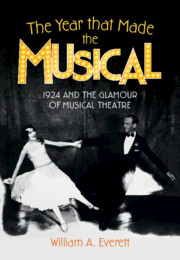
- Coming soon
- Publisher:
- Cambridge University Press
- Expected online publication date:
- July 2024
- Print publication year:
- 2024
- Online ISBN:
- 9781009316545


Whether they appeared on Broadway or the Strand, the shows appearing in 1924 epitomized the glamor of popular musical theatre. What made this particular year so distinctive – so special – was the way it brought together the old and the new, the venerated and the innovative, and the traditional and the chic. William Everett, in his compelling new book, reveals this remarkable mid-Roaring Twenties stagecraft to have been truly transnational, with a stellar cast of producers, performers and creators boldly experimenting worldwide. Revues, musical comedies, zarzuelas and operettas formed part of a thriving theatrical ecosystem, with many works – and their leading artists – now unpredictably defying genres. The author demonstrates how fresh approaches became highly successful, with established leads like Marie Tempest and Fred Stone appearing in new productions even as youthful talents such as Florence Mills, Fred and Adele Astaire, Gertrude Lawrence and George Gershwin now started to make their mark.
‘William Everett examines the musical across continents, genres and languages in the seminal year of 1924, when the constellation of current and future stars aligned to create works of artistic brilliance and great popularity. For the first time in critical musical theatre scholarship equal treatment is given to cultural capitals across the Atlantic such as Madrid, Buenos Aires, New York, London, Berlin, Vienna and Milan, and to the multitude of genres that comprise musical theatre. Everett casts his net widely to include the usual characters - the Astaires, the Gershwins, Coward, Kern, Hammerstein, Romberg - and also less well-known figures, such as Sissle and Blake, Florence Mills, Emmerich Kálmán and Amadeo Vives – all of whom are part of the history of the musical in 1924. Beautifully researched and engagingly written, this is a virtuosic tour de force.’
John Koegel - Professor of Musicology, California State University
‘William Everett’s decision to cast 1924 as the Wunderjahr of the musical is inspired. What a time it was! He surveys it all: musical comedies, lavish and intimate revues, zarzuelas and operettas, featuring the rise of the Astaires and the Gershwins and the heyday of numerous stars. The shows opened in New York, London, Paris, Madrid, Milan, Vienna, Berlin, and Budapest; their settings ranged from the Canadian Rockies to Damascus by way of Greenwich Village or the Thames; and their improbable but often socially probing plots encompassed infidelity, bootlegging, drug dealing, sex working, people trafficking, and personal journeys from riches to rags and back again. Everett, duly sensitive to the contexts of both now and then, is an expert guide to all the glamor and a complete master of the literature and such primary sources as still survive.’
Stephen Banfield - Stanley Hugh Badock Professor of Music Emeritus, University of Bristol
‘In the timeline of musical theatre history, there are certain years that stand out in large, bolded typeface as turning points for the form. In 1957, West Side Story and The Music Man both entered the canon as two very different examples of a changing form. In 1964, Funny Girl, Fiddler on the Roof and Hello, Dolly! represented a glorious sunset for the Golden Age of the genre and hinted at the direction it would take in the next decades. In The Year that Made the Musical, William Everett convincingly demonstrates that 1924 has been overlooked as another such pivotal year when the changes and developments that might ordinarily play out over a decade were compressed into a single twelve-month period.’
Doug Reside - Curator, Billy Rose Theater Collection, New York Public Library for the Performing Arts
‘Musical theatre in 1924, the single year addressed in this innovative book, consisted of comedies, revues, and operettas, and was chara-cterized by transnational influences, transfers, and migrations. By using a comprehensive approach to a defined period, Everett provides a fascinating cross-sectional perspective on the interactions between countries, politics, and the production of musicals.’
Millie Taylor - Van den Ende Chair of the Musical, University of Amsterdam
 Loading metrics...
Loading metrics...
* Views captured on Cambridge Core between #date#. This data will be updated every 24 hours.
Usage data cannot currently be displayed.